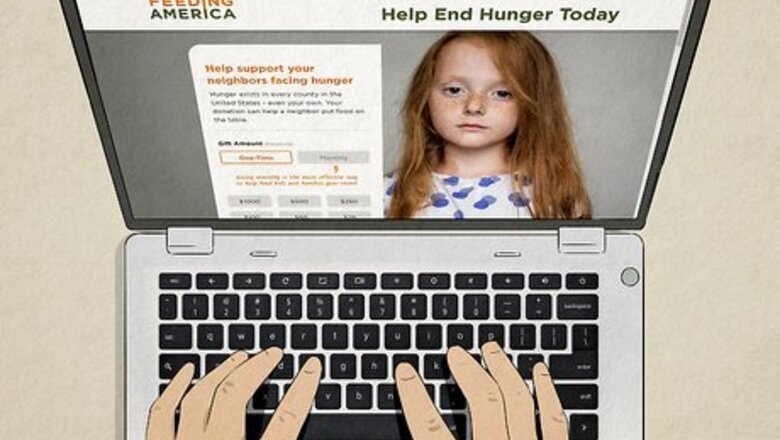
views
- Look for a reputable organization and donate money to have an immediate impact.
- Cash donations are often preferable to clothes and other physical goods because storage is a challenge.
- Get the word out and contact your local politicians to encourage others to do more.
Donate to a national disaster relief organization.
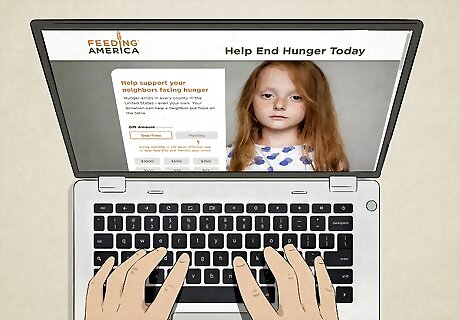
Send money to a reputable organization that can help. Put your money where it will be most effectively spent to help people in need. Some trustworthy organizations to consider donating to include UNICEF, Direct Relief, or Habitat for Humanity. Check the Better Business Bureau, Charity Watch, or Charity Navigator website to find out if the charity you are considering donating to is reputable. You may also consider donating money to organizations like ASPCA and The Humane Society to help animals that have been affected. If you’re looking for groups that help those in need, Feeding America and Samaritan’s Purse are trustworthy organizations. Want to specifically help young people in crisis? Consider Boys & Girls Clubs of America, Step Up for Students, and Compassion International.
Find a local organization to support.
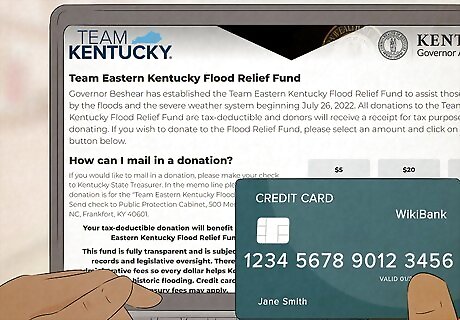
If there are any smaller groups in the affected area, donate there. The massive humanitarian organizations, like UNICEF, are excellent at helping people. But if there is a local organization nearby active, your money may be better spent there because it will be put to use faster. Find local programs in the impacted area to donate to by looking online or visiting the National Voluntary Organizations Active in Disaster (NVOAD) website. For example, if a hurricane hits in Florida and there’s a huge immediate need for help, you might donate to Volunteer Florida or the Heart of Florida United Way.
Organize a fundraiser.
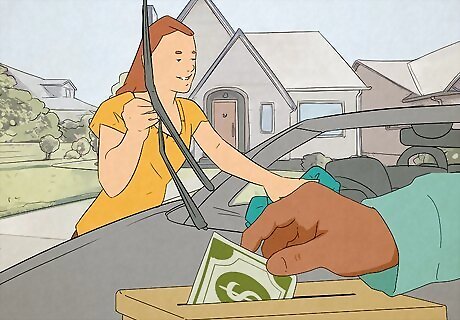
Set up a bake sale or car wash with your classmates or coworkers. Collect donations by setting up a collection jar at your school, work, or a local restaurant, or simply asking your friends and neighbors directly for help. Other fast and easy ideas include bake sales, lemonade stands, yard sales, or car washes. Once you have collected the money, donate it to a national organization or local program. Ask your school or workplace if they’ll match your donations!
Donate your blood at a blood bank.
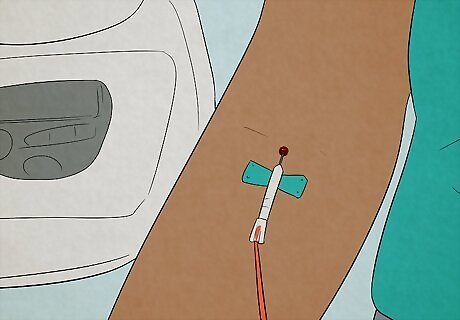
There is often a shortage of blood after major disasters. Contact a local blood bank and make a donation. You can literally help save a life, especially after major disasters which can disrupt blood supplies. Check the American Red Cross’s website for the specific donation requirements in your area and to schedule an appointment. You can donate blood at any time, even before a disaster strikes. Your blood will be held on reserve, and will be immediately available to use when it’s needed. Anyone can donate so long as you’re between 18 and 65 years of age and you don’t have any disease or condition which can be transferred via blood.
Give away clothes and goods you don’t need.
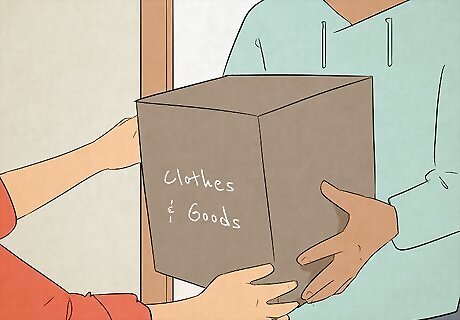
Donate clothes and household items if you live near an affected area. Search NVOAD online to find local food banks, shelters, and faith-based organizations that are providing relief efforts and to find out what items are accepted. Keep in mind, organizations may not accept certain items if they can’t use them right away. Sometimes, even basic necessities, like water bottles, can’t be accepted due to logistics like storage space and delivery costs, so it’s best to call ahead or check online to find out what’s needed. The supplies that are needed often depend on the type of disaster. For instance, mops, buckets, and dehumidifiers might be needed if you want to help flood victims. While it may be natural to want to send toys to help comfort children who have been affected, toys are typically not encouraged because they are not considered an immediate need, and also due to other concerns such as storage and distribution.
Spread awareness online.
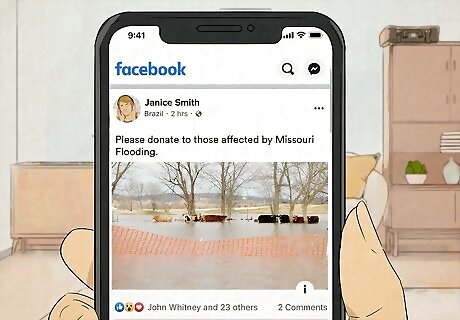
Share posts about what’s going on to let others know. Getting the word out about the need for help can be more impactful than any donation you might make. Share news stories that cover breaking info pertaining to the disaster. Strike up conversations online to let folks know how serious the situation is. This can mobilize people to donate their time, money, and energy to help people in need. Use trending hashtags to contribute to the growing conversation and spread awareness. If there is any kind of ribbon campaign (like the blue and yellow filter for the Ukrainian flag), change your profile pictures to let others know you care.
Volunteer at a local charity organization.
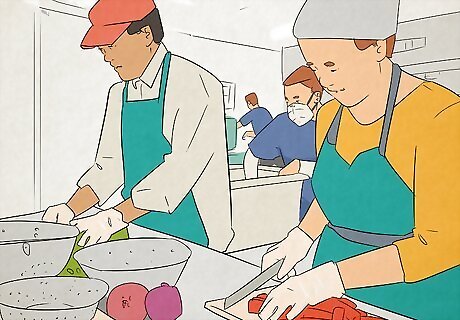
If you live in the affected area, find a local organization to volunteer with. Reach out to a nearby church, soup kitchen, charity organization, or non-profit and ask them if they need volunteers. Help cook or serve food at a relief kitchen, organize donated items at a church or charity, answer phones for an organization, or deliver food and water. If you aren’t sure how or where to help and you live in the US, call 211 on your phone. They’ll help you find a community organization that is looking for volunteers.
Shelter displaced families or animals.
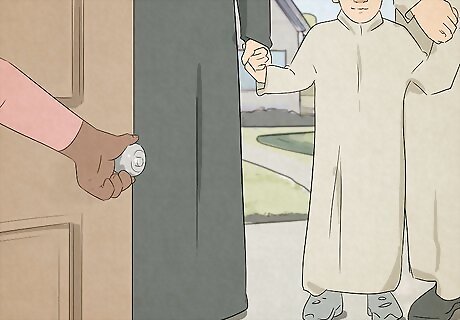
In the aftermath of a disaster, you may be able to provide housing. There is often an immediate need for shelter if a lot of people have lost their housing, so if you have unoccupied rental property or vacation home, this would be a great way to help. Alternatively, if you live near an affected area and have a room to spare, consider opening up your home to a family in need. Look online for an organization near you that will connect you with someone in need. Contact an organization like ASPCA or the Humane Society to see how you can help provide support for animals that have been affected.
Help rebuild homes or public spaces.

Use your skills or trade to help rebuild damaged areas. There is always a need to repair homes and buildings that have been damaged or destroyed in a disaster. Volunteer your time and energy to help reconstruct and repair things that were destroyed. For example, if you know how to do excavation, you can help by clearing and preparing land. If you do any type of construction work, you can use your skills to repair or reconstruct homes and buildings. Whether you live in the disaster area or need to travel to the disaster zone, you can help with rebuilding through organizations like Habitat for Humanity. You can also help on your own by contacting your local officials to see where help is needed. Even if you are not skilled in a specific trade, you can help with other tasks like removing debris for site cleanup, shoveling, or delivering supplies.
Contact the state and federal government.
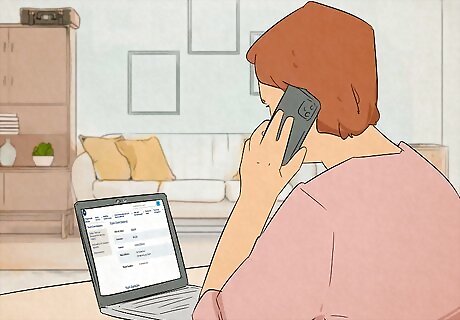
Urge your representatives and politicians to do more. Put pressure on your governor, senator, and representatives to allocate more money to the disaster relief, and urge them to speak up. Make it impossible for the people in power to ignore the need here. Write letters, urge your friends and family to do the same, and be persistent. You never know which phone call or letter will have the most impact! You could even protest outside of your local public representative’s office to encourage them to do something while also spreading the word.














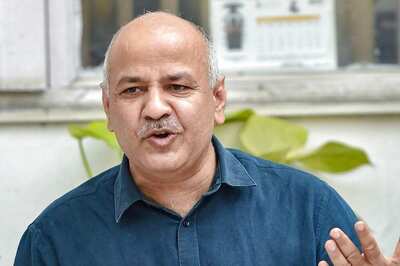





Comments
0 comment